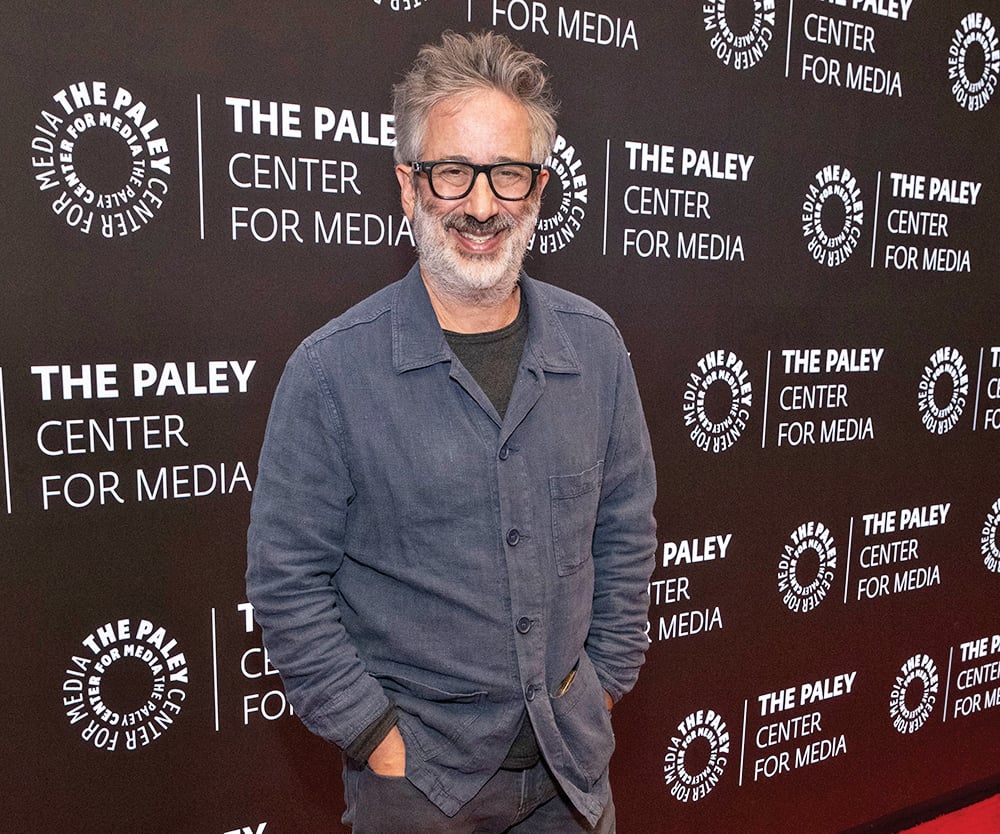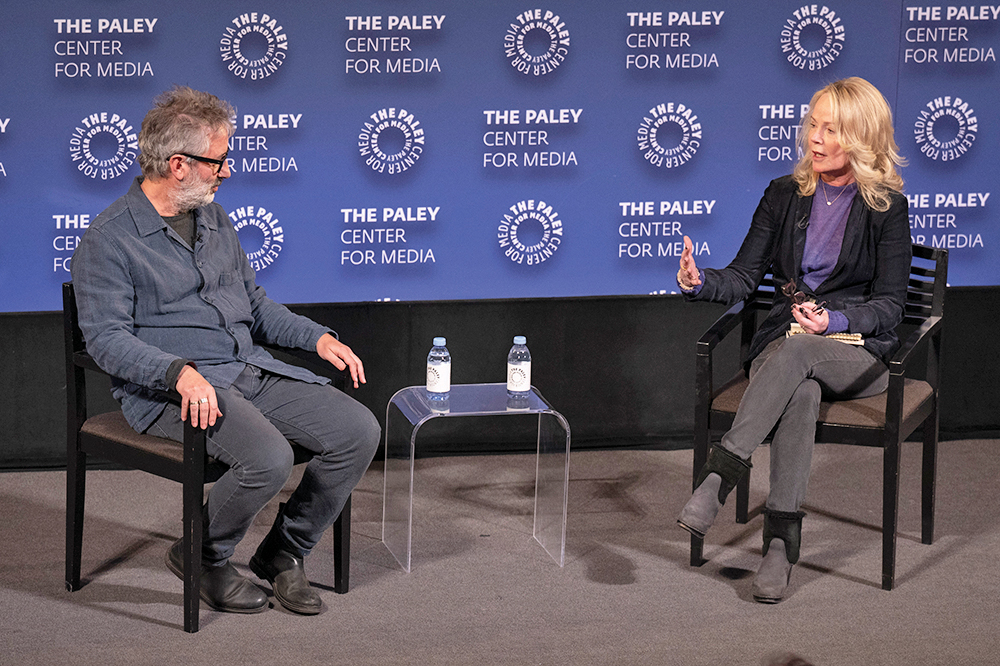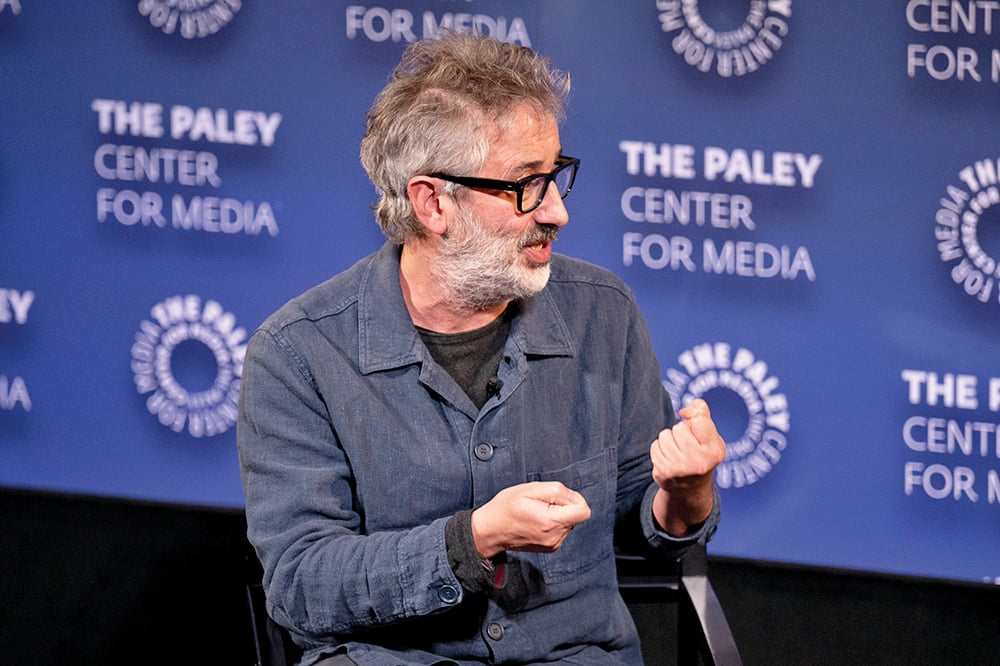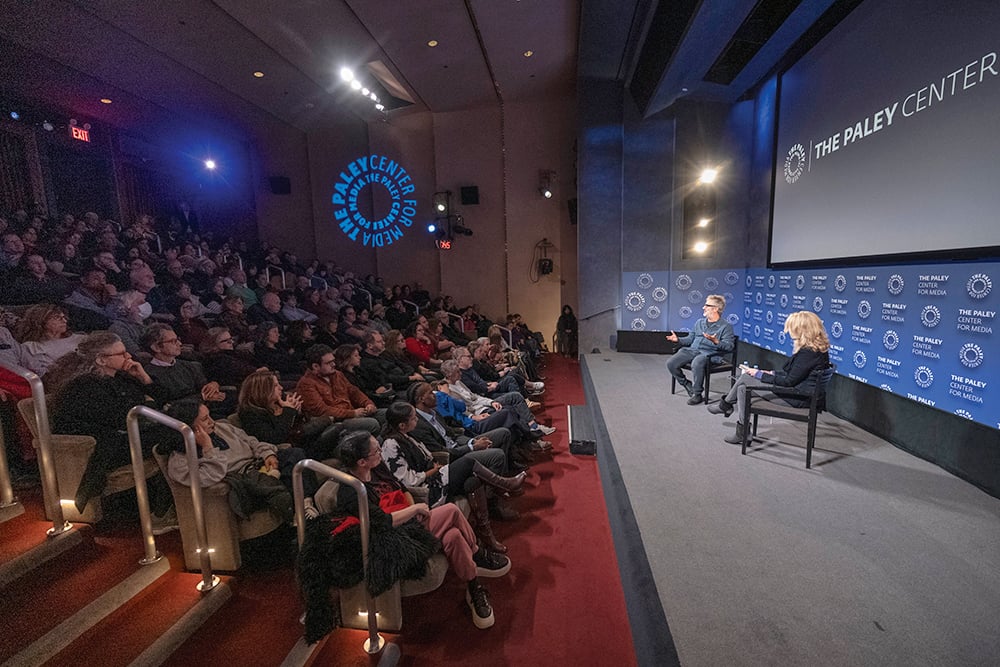
David Baddiel is a British comedian, author, playwright, television performer, sportscaster, filmmaker, and outspoken Jew. The Paley Center for the Media’s December 12 screening of his Jews Don’t Count documentary, and his discussion with author Dani Shapiro, align with the Paley Impact series’ theme– the media’s role in combatting antisemitism.
I felt compelled to enlighten my family about Baddiel’s multi-faceted accomplishments and All Things British, until I uttered his name, and my youngest son said, “Oh yeah, 20 years ago, I dressed up as Baddiel the sportscaster for Purim.” After I recovered from being one-upped by a Millennial, I tried to convey the spot-on humor in Baddiel’s Jews Don’t Count. Did I succeed? Stay tuned.

(Courtesy of The Paley Center for Media)
Noted by Their Absence
Baddiel concentrates on the absence of Jews in conversations/discussions/media, rather than the spate of antisemitism—i.e., physical attacks, verbal abuse, property damage, endangerment, and intimidation of Jews (which exponentially increased after 10/7). This absence in conversation, arts, and virtually every arena of modern life—constitutes a near total exclusion of Jews as a legitimate minority.
In a U.K. Channel Four (2022) press interview, prior to the Jews Don’t Count documentary release, Baddiel offered:
“It’s about Jews not being mentioned and not being included… you’ll see a lot of visibility months…Pride marches…Days. Where’s the Jewish visibility month…history month… Pride Day? They’re not there…why is that? …we are a minority who has, over centuries, faced a certainly equivalent violence and discrimination as any other minority…Yet we seem to be continually not quite accepted…the majority culture is… more worried about minorities, but seemingly less so about Jews.”

Notwithstanding the Jewish jokes, others’ and his own, this brilliant thinker, and self-proclaimed atheist strikes at a centuries-old truth; Jews are hated for allegedly being both the lowest of creatures and at the apex of power in society, secretly siphoning off others’ hard work and resources to enrich themselves. Jews are rich, goes the stereotype, and don’t need others’ assistance, when in fact, many poor Jews exist.
Baddiel illustrates this by referencing his own childhood in a working-class area of London, where no one had money. Ironically, his German maternal grandfather was wealthy, until the Third Reich stripped him of everything. Penniless, he fled with his family (including Baddiel’s three-month old mother) to England, where he started his life all over again. Baddiel’s brother drove a cab in New York.
What About the Yids?
Whatever the disparity between Baddiel’s description of his kippah-wearing early education in a London Jewish day school and his professed adult atheism, he calls out subtle and non-subtle microaggressions aimed at Jews. He and his brother made a two-minute film about UK teams’ football (read soccer) fans who relentlessly malign the Tottenham Spurs team. The ‘Spurs’ last three owners are Jewish, and the team is based in a largely Jewish section of North London. They’re shouted at– “Yids,” or “Yiddos” by Tottenham fans (and others), who also often hiss at matches, emulating gas chambers.
One can imagine these taunts in a visceral way, when in the documentary, the camera captures Baddiel and his brother looking out at the huge stadium, and Baddiel recounts a confrontation in the stands between his brother and one such “Yid” chanter. It’s even more incomprehensible that in 2020, the Oxford English Dictionary legitimized one meaning of the term Yid as “a supporter of or player at Tottenham Hotspurs games;” Jewish groups, including the Community Security Trust, objected to the lack of contextualization—given that the term is generally used in an offensive and/or abusive way.

From the Stars’ Perspective
Baddiel’s global interviewees– Jewish celebrities, authors, and others revealed their feelings about rising antisemitism and alternatively, pervasive “radio silence” about Jews. Among them were Sarah Silverman, Friends’ star David Schwimmer, and British Australian actor Miriam Margolyes. They noted increased antisemitism, and an absence of Jewish voices across the arts and elsewhere. They may be secular Jews, but all three revealed a deeply embedded Jewish identity (Margolyes vehemently opposes Israel’s politics).
It would be a good counterbalance, though, were Baddiel to meet with students on campuses, Jewish families, and the “average” Jewish man/woman, something like the “old” Tonight show’s “Jaywalking” segment, where Jay Leno randomly interviewed people on the streets. That might be a more effective barometer for assessing antisemitism than the views of those whose privilege potentially shields them, and allows them to shield themselves, from the full impact of antisemitic aggressions or microaggressions.
As for Baddiel himself, he refuses to speak for Israel. The absence of respectful conversations about Jews today, and the fact that his work is published worldwide, do not make him feel obligated, he said, to account for what is going on 4000 miles away. Post-October 7, he does feel a stronger connection to Israel, but it also seems like people expect him to comment on and/or apologize for Israel’s actions in Gaza and Lebanon, which he will not do.
What, No Journalists?
When I attended the documentary/discussion, I sat in the several rows reserved for journalists, on the auditorium’s upper left side. The only journalists I saw were me, and Simon Applebaum, a broadcast journalist/podcaster, who left early (although Paley’s press officer mentioned a couple of additional journalists present somewhere). Instead, an overflow audience occupied that section. When I raised my hand during the Q&A time to point this out to Baddiel, he quipped, “that’s because Jews don’t count.”
Then Baddiel turned serious, noting that his only interview was with The New York Post, whereas it should have been with The New York Times, not because of him, but “this is a subject that should con(cern)….particularly this city…” When Jews Don’t Count was published, The Times asked Baddiel to write an opinion piece, which he did–one in which he ”…summarized what you’ve just seen.” The paper never printed it. Four months later, he received a message saying that ” the editor felt it wasn’t really the kind of thing we should be covering at the moment.” That decision maker wasn’t necessarily an antisemite, Baddiel said, but rather someone who didn’t want to make trouble or felt it more important to cover another minority’s issue.
If Jews don’t count, then what need is there for antisemites to engage in overtly antisemitic acts? If Jews count, then methinks these antisemites “doth protest too much.” In either circumstance, Baddiel’s wit and field research underscore the absurdity of how Jews’ no-win position is passively constructed to de-legitimize a legitimate minority.
Rachel Kovacs, PhD, adjunct associate professor of communication at CUNY, also teaches Judaics locally, and is a PR professional, freelance writer, and theater reviewer for offoffonline.com. She trained in performance at Brandeis and Manchester Universities, Sharon Playhouse, and the American Academy of Dramatic Arts. She can be reached at mediahappenings@gmail.com.








